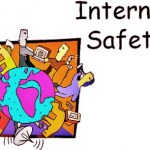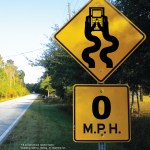Internet
The service tower attached to the iconic floating egg atop the Institute's Koffler accelerator (the "spaceship" in the photo, left) has recently been graced with a charming, shiny silver skullcap - an observatory dome. Formally known as the Martin Kraar Observatory, it houses two telescopes, and it figured in two of our recent press items. We spoke with observatory director Ilan Manulis of the Davidson Institute of Science Education:
WSW: Tell us about the telescopes.
IM: The larger one is a 41 cm. (16 in.) telescope. Due to special optical properties, it has the power of a much longer…
Which for those of you who don't know what the Mad Biologist's Pentultimate Political Philosophy is, it's very simple: people have to like this crap. Recently, I upgraded to Firefox 4 and I've been having 'stability issues', although they seem to have decreased in frequency somewhat. Which brings me to this excellent post about the increasing unreliability of personal computers:
Here's one we all know well: you visit a page you visit everyday, probably a page you visited just minutes ago. Nothing has changed on your end, but suddenly the page locks up. The little egg timer tells you the…
This is incredible, from The Wall Street Journal!!
"I panicked and said I was hacked," said Mr. Weiner at the late afternoon news conference at a midtown Manhattan hotel.
What was he thinking?
See my previous post, giving him the benefit of doubt. So much for the dangers of hacking and computer privacy in this case, but it's all too real.
Excerpts:
New York Rep. Anthony Weiner on Monday admitted sending sexually suggestive photographs to women online but said he doesn't plan to resign from Congress because of the scandal.
"I panicked and said I was hacked," said Mr. Weiner at the late…
Source.
The recent news media storm about Rep. Anthony Weiner (D-NY) and the "Twitter prank" highlights the importance of internet safety and security. It is not surprising that someone could hack into a public official's Twitter account and post an embarrassing picture. But online social networks are only part of the story, and ad blockers may be your best ally.
A study recently presented at the Web 2.0 Security and Privacy conference in Oakland, California is, well, terrifying. Consider this, from the AT&T Labs and Worcester Polytechnic Institute researchers' abstract, testing more…
Source.
I had a dream last night of harvesting MMORPG time to save the planet. Let me explain.
Massively multiplayer online role-playing games (MMORPG) are deeply engaging millions of players, spending some 21 hours per week in a virtual world according to The Daedalus Project. The World of Warcraft alone has more than 12 million subscribers, part of an industry that exceeded revenues of $1 billion in 2008.
Consider the scale of the time investment - 12 million players averaging 21 hours per week!
MMORPG's allure is understandable. They offer an alternative experience in which one is…
Enthralled by the power of online social networking and search engines to advance my research projects and feed my insatiable appetite for information, I was under the impression that things were more or less under control. I was wrong.
It began innocently, with tentative explorations into Twitter feeds and Facebook pages from professional organizations, then expanded into LinkedIn. Whenever I find a new article of interest to my friends and colleagues, my instinct is to share with them, in the hope that they will learn from it and possibly use it in their work.
As a scientist doing…
Teaser for "Black Beach" from Fourth World Media, LLC on Vimeo.
Video.
I recently wrote about "oil-eating microbes" and the lack of evidence that they will offer a solution to cleaning up the environmental nightmare that began last April after the BP oil spill.
What will BP's "black beach" burden become?
I believe that new technologies will guide us towards a solution and hope that it will provide enduring lessons that will prevent such an environmental disaster from ever happening again. As is now commonplace in regions in crisis, online social networking can serve as a powerful tool in…
Source. Second place winning design, from Kayla Rivera at Valencia CC, Wiley Student Advertising Design Challenge: Texting & Driving Don't Mix
Any driver knows the dangers of texting. Yet this practice has become commonplace. Dr. Robin Landa recently challenged students to design an ad campaign about the dangers of texting and driving; the design above is one of my favorites.
But texting can also save lives, even for the illiterate. Let me explain.
There are emerging open source technologies, based on network science and crowd sourcing that promise to transform how we respond to…
Source.
Media mogul Arianna Huffington was posed a provocative question:
What if you ruled the world?
Her answer will likely surprise you. Read on if you dare.
From Prospect magazine:
I would order the creation of a high-tech tool that forces us to disengage from our 24/7 connectivity.
Why? "Knowledge has three degrees," wrote the third-century philosopher Plotinus, "opinion, science, illumination. The means or instrument of the first is sense; of the second, dialectic; of the third, intuition." Our always-on culture has contributed much to the first two kinds of knowledge--science and…
In 2007, my friends at m ss ng peces and I started work on a new Internet-television show called RESET, for the Sundance Channel. The idea was to make a show designed for computers to watch, that could teach them what it was like to be human -- a show that, while ostensibly made for human beings, would also nourish our computers' circuit boards with generous descriptions of the richness of human experience. Obviously this is just an artistic conceit, and not, as far as I know, a practicable reality, but it does raise a lot of interesting questions. You probably spend your entire day within…
Dear readers,
With "Dean's Corner" in its third month, I would like to learn about you. Inspired by Ed Yong's thread, I ask that you tell me about yourself, your interest in science and how you got here.
I'm intrigued that readers of this blog are spread far and wide. Here's a snapshot from yesterday's pageviews:
From Ed Yong's thread at Discover:
In the comments below, tell me who you are, what your background is and what you do. What's your interest in science and your involvement with it? How did you come to this blog, how long have you been reading, what do you…
Tonight, President Obama will give his State of the Union address at 9 pm with a new twist: using the latest online technologies, including streaming visual aids, with charts and statistics relevant to his comments. What a wonderful way to engage and educate the public!
See you online.
From Senior Advisor to the President David Plouffe:
Good morning,
Tonight at 9 p.m. EST, President Obama will deliver the State of the Union Address and outline his vision for putting aside the politics that divide us and moving forward to create jobs, up our game to out-compete in the global economy, and…
I receive many emails from students that were likely composed using a mobile device. Their sentences do not contain capitals ("i request..."), there are often grammatical and spelling errors as well as incomplete sentences. This comes as no surprise, I know.
But tYp3 LyK tHi5?
What is the point of this? Does it reflect a generation gap?
Perhaps this is simply a farce, a hook to get people's attention on the web. I admit that it got my attention, if only as a reminder of the challenge of written communication with so many choices of mobile devices and networks.
This latest example seems…
There has been a media storm over Sarah Palin's "invention" of the word "refudiate" as an ersatz term for repudiate. In her own words, as reported today in The Huffington Post: {apparently she blamed the "typo" on her Blackberry...not inconceivable.}
"I pressed an F instead of a P and people freaked out," said Sarah, pointing out that her blunder was the second-most-searched word on Google trends. "Make lemonade out of lemons," said Sarah.
For a brief 23 second explanation, including an apparent mocking tone of the English language as a "moving, breathing, evolving art" {I do not believe…
By inspire*dream*create*, Rachel Souza's Flickr Photostream
I realize that I am a new blogger for this site, and have enjoyed the challenge of sharing some of the latest scientific breakthroughs as they are happening. I have enjoyed reading some of my fellow bloggers, "Sciblings," learning about new discoveries from their perspectives.
I have also noted a lack of civility in some articles on this site. To such bloggers, I would like to respectfully make a call to civility. I have noticed an unfortunate tendency for some of them to use terms such as "dumbass" and "stupid" in articles…
If you are fascinated with word usage, I suggest you try a powerful new tool, Google NGram Viewer. According to the website:
What's all this do?
When you enter phrases into the Google Books Ngram Viewer, it displays a graph showing how those phrases have occurred in a corpus of books (e.g., "British English", "English Fiction", "French") over the selected years. Let's look at a sample graph:
You may have noticed the term "schadenfreude" appearing more and more, defined as the pleasure derived from the misfortunes of others. Its usage is, I believe, a telling by product of the explosion of…
Jennifer Daniel and Sandi Daniel, The New York Times image
THERE you are, peacefully reading an article or watching a video on the Internet. You finish, find it thought-provoking, and scroll down to the comments section to see what other people thought. And there, lurking among dozens of well-intentioned opinions, is a troll.
"Where Anonymity Breeds Contempt", Julie Zhou, product design manager at Facebook, The New York Times Op-Ed.
Many families are awakening today to the joy of sharing gifts for Christmas. A thought occurred to me: I wanted a Trollinator Nanobot for Christmas. But I…
The IBM 705 Data Processing System, introduced in 1954.
The 705 would rarely run more than 3 or 4 hours without a major breakdown. It was not unusual to encounter a 705 that was ablaze." This should give all of us pause the next time our PC crashes!
What is your family's history? Have you ever reflected on what their lives was like, when life was seemingly simpler? What if we could take a snapshot of our lives, our families, just one, every ten years? What was your family doing 100 years ago?
Let me share some "snapshots" of our ordinary family {a personal and idiosyncratic point of…
Jurvetson's Flickr photostream
Do you think that there should be universal access to the internet, regardless of how it is accessed? Should the internet be regulated by the federal government? If so, to what extent? Is "Net Neutrality" possible? For now, "neutrality" when it comes to accessing the internet is an illusion.
These questions, to some degree, have been addressed by the approval of new rules by the Federal Communications Commission (FCC) today. Below are some key things to consider:
Excerpted from an NPR story today:
A divided FCC has approved new rules meant to prohibit…
So Google has released this Ngram thingee that searches for words in all of the archived Google stuff. So I decided to look for the words "MRSA", "staphylococcus", and "Staphylococcus." Here's what I found:
You'll note that both staphylococcus and Staphylococcus surge around the same time as the influenza pandemic of 1918. What's odd though is that if we drill into the years 1910-1920, the highest use of both words is around 1913, although it doesn't decrease much until after 1920. Presumably, bloodstream infections (sepsis) from WWI, followed by the influenza pandemic--in which…









